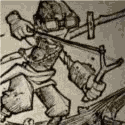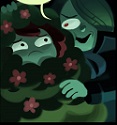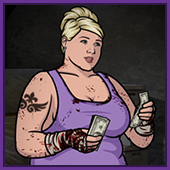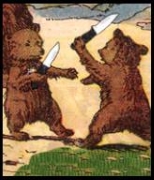|
I have to admit, if the players want to play a game in a Shadowrun style - meticulous planning and foot-dragging and all - then... my initial impression is to say "If that's how they want to play the game, why not let 'em?" I mean, as long as they're having fun, you know? There's a tendency, sometimes, when GMing - and it's one I've fallen prey to many times myself - to say 'dammit, why won't the players just follow my story, it's the story I want to tell, they should do what I want them to do,' which is really crippling to player agency. Personally I tend to err on the side of 'let the players do what the players want to do, because they deserve to have fun too.' I mean, it's got to be fun for the GM, too, sure... but the way it reads to me, My Lovely Horse, is that you're expecting your players to adapt their play to suit your GMing but aren't willing to adapt your GMing to suit your players' style of play (that bit about 'the onus is on them' set off all kinds of alarm bells for me, but that may, I freely admit, be more a reaction to some of the GMs I've gamed with than anything else...). You say you agreed on a kind of mutual prompting, of letting each other know how circumstances could be adjusted to suit planning, and that's really the best actual advice I think you could get - and you already did it. I guess I'm just trying to say that you really need to try and remember that the onus is on everyone in the game. Also, if all else fails, I've found it occasionally useful to just burst out and say "Okay, look, what are you guys planning? If you tell me, I can keep that in mind when you're asking me these questions so that the information I give you is actually, you know, useful." That works, sometimes.
|
|
|
|

|
| # ? May 9, 2024 05:53 |
|
Mendrian posted:I've found players often assume that I have some pre-planned "correct approach" to a problem (I don't) and are probing me to discover what that might be. Or even worse, they think that I've created a 'real to life' simulation of some in-game thing and they need to think around it. Either way they're trying to engage in problem-solving. DivineCoffeeBinge posted:the way it reads to me, My Lovely Horse, is that you're expecting your players to adapt their play to suit your GMing but aren't willing to adapt your GMing to suit your players' style of play  There's a paragraph in the 13th Age book that sums up my approach, or what I'd ideally like it to be, quite well. quote:In traditional roleplaying games, the GM is a neutral arbiter, and when a player asks questions about the world or setting, it’s the GM’s job to discern the answer that makes the most sense in the world. The GM doesn’t need to know the player’s reason for asking because the GM’s answer is based on the fiction of the world rather than on the needs of the drama. In some campaigns, the players are even careful not to let the GM know their intent so that the GM can’t foresee the player’s plan and block it. If the PC can talk to animals, for example, the player might ask a number of leading questions about the surroundings hoping to corner the GM into saying that there are animals around so that the player can spring a means of talking to animals on the unsuspecting GM. We encourage you to take just the opposite approach. Explain to the GM what you hope the answer will be and why so that they can take that into account when inventing an answer. e: hell, the other bit on the same page (60) applies just as well. It boils down to "yes, playing things safe makes sense for the characters, but can be boring for the players, so go ahead and create interesting scenes." My Lovely Horse fucked around with this message at 12:02 on Jul 29, 2014 |
|
|
|
My Lovely Horse posted:The way this game came about is that I said, hey, I feel like running a game, we could do a really combat-focused 4E game or a more free-form 13th Age one, anyone interested? And I got enough interest in 4E that it was worth it running that. So that's something we all agreed on before we started; To be fair, agreeing that you want a combat focused game does not exclude that the world is a deterministic Rube Goldberg contraption that must be carefully interacted with so as not to come crushing down on their heads. Maybe you thought that "combat focused" means "All encounters will be balanced to be challenging but fair", but for someone who hasn't played 4E before it could very well mean "listen here, there will be a lot of people who want to kill you, you better always prepare for the worst". Next time you guys gather to play, just watch The A-Team (the movie) instead. This is the game you want to play, they just don't know it yet. Rexides fucked around with this message at 11:29 on Jul 29, 2014 |
|
|
|
This contention between planning and surprises is something I struggle with as a GM and am trying to deal with in my heartbreaker. I really do feel that turning an encounter into a risk-minimizing optimization problem just leads to gameplay that is a slow slog that only engages the players who want to intellectualize the game and quickly leads to quarterbacking on the part of the system masters. Whether the players know it or not, I observe them having more fun when they are engaged with character and drama rather than system math, and the situations that evoke these are most often the unexpected surprises that every player would say that they hate because the uncertainty makes them uncomfortable (but what is drama without tension and release?)
|
|
|
|
Paolomania posted:This contention between planning and surprises is something I struggle with as a GM and am trying to deal with in my heartbreaker. I really do feel that turning an encounter into a risk-minimizing optimization problem just leads to gameplay that is a slow slog that only engages the players who want to intellectualize the game and quickly leads to quarterbacking on the part of the system masters. Whether the players know it or not, I observe them having more fun when they are engaged with character and drama rather than system math, and the situations that evoke these are most often the unexpected surprises that every player would say that they hate because the uncertainty makes them uncomfortable (but what is drama without tension and release?) An interesting design approach might be for players to be able to plan, but know in advance (based on their resource expenditures, a minigame, or luck) how many things will go wrong, or at least the range of the number of disasters, at a minimum of one. They won't know what will go wrong -- that's for the GM to decide and make entertaining -- but their planning/luck/minigame success can reduce the amount of trouble.
|
|
|
|
homullus posted:An interesting design approach might be for players to be able to plan, but know in advance (based on their resource expenditures, a minigame, or luck) how many things will go wrong, or at least the range of the number of disasters, at a minimum of one. They won't know what will go wrong -- that's for the GM to decide and make entertaining -- but their planning/luck/minigame success can reduce the amount of trouble.
|
|
|
|
DivineCoffeeBinge posted:I have to admit, if the players want to play a game in a Shadowrun style - meticulous planning and foot-dragging and all - then... my initial impression is to say "If that's how they want to play the game, why not let 'em?" I mean, as long as they're having fun, you know? The GM is a player, too, and deserves to have fun as much as the party. If the players want to be super-cautious and plan for every contingency, that's a lot of time where the GM just isn't really doing much beyond answering simple questions. I've run games where I made it really clear that I am not going to poo poo on the PCs for not solving my dungeon puzzle 100% before they set foot inside, but they're just so used to that level of GM dickery that they still try to do the whole "outsmart the GM" thing. It's really boring to run games for that kind of player when you are actively prodding them to go do cool poo poo without sweating the details.
|
|
|
|
Paolomania posted:In a way, this is what FATE does with the Fate Point economy. The players always know that there will be this karmic balance between doing awesome stuff and poo poo going wrong. That kind of economy also happens in Edge of the Empire with Destiny points, which is what I'm more familiar with. I guess I might be needlessly complicating things, but I am imagining something separate from in-the-moment "whoa"-points, where their actual planning makes a difference, but not so much difference that the GM is stuck or the mission need not be played. Spending "whoa" points to lock down certain aspects of the plan makes MORE things go wrong, rather than fewer, so it's not what I'm after. Maybe something more like preparation cost vs. expected returns (like in Desktop Dungeons, if you've played that -- spending money on what you think/know you need, but then profiting less and still having some unexpected elements).
|
|
|
|
Ah, yeah I'm currently considering a design where the GM gets a fixed number of twists per encounter, so that the players can plan their approach, but know that a specific number of to-be-decided other shoes are going to drop. I'm not aware of a system that specifically gives the GM this (although one probably exists).
|
|
|
|
I've just volunteered to run a one-shot pitched as 'post-apocalyptic biker knights fight giant crabs with lances', and at some point I want someone riding the top of an autonomous train to kill a gigantic crab with their jousting skills. Humans have primitive superstitions about 'spirits', actually ai-controlled machines, and are besieged by heavily-armoured crustaceans (a man-sized crab takes extreme measures to kill, like chainsaws, siege crossbows and, of course, lances). The crabs are merciless, and the ai are mostly indifferent. I have mechanics and setting down, but I'm a bit lost for adventure design. How do I connect vague ideas of cool set pieces into an adventure?
|
|
|
|
Tesla was right posted:I have mechanics and setting down, but I'm a bit lost for adventure design. How do I connect vague ideas of cool set pieces into an adventure? You stay calm and don't attempt to cram all of your 'wouldn't it be cool if this happened' ideas into one scene. You think about how people in this robot crabpocalypse setting might live. That is, people, in the background, not your murderhobo adventuring leads. What sorts of things would be scarce for them? How would they deal with the looming crab threat without badasses around? Where would they be sending a train to or from? Figure that out, and you've got a train. And then, what incentive would the players have to end up on that train? If there's an ever-present crab threat and the players are violence heroes, and you don't have any better ideas, it could be as simple as, 'hey we'll give you $50 crabbucks apiece if you make sure this shipment gets there in one piece.' Or maybe they don't care about crabbucks so much, and whatever's in the train is more valuable, or interesting to to them, than a reward. Maybe it's plague medicine for the next village over. (yawn) Or a huge amount of butter, to eat crabmeat with. Or shells for a giant, pre-apocalypse crab-crackin' cannon. Or busted computer parts that they're taking to a shaman who knows what to do with 'em. Have something cool in mind if they play it straight and get the job done (they get a reward plus it hooks into another immediate opportunity) and let them come up with a plan to steal the poo poo if they really want to. They run through a scintillating field of small murdercrabs on the way there. They can hear the smaller ones crunching by the score, between the wheels and rails. The train starts slowing down and/or threatens to jump off the rails because it's tripped up on so much loving crab meat. Dog-sized crabs start flinging themselves at the train, and a few get purchase and start climbing in through the windows and/or tearing their own holes in the side. In the distance, a mile and a half ahead, past a fork in the rails, they see Pincir Gigantor, the hulking crab-mother. She is like a hill that walks, her carapace glitters in the sunlight from the dozens of metallic weapons stuck into her shell through the years. A few of the obvious ways to deal with that are; A) gently caress this situation, full reverse, let's go back where we came from. The players probably won't do that, but giving them the option of retreating heightens the sense of voluntary daring when they go forward. B) Hurry up and clear the minicrabs off the rails, get going down the left fork to deliver the cargo before megacrab gets too close. (she will follow them tirelessly if they do this, they'll have time to come up with another crab-crackin' plan) C) Hurry up and clear some of the minicrabs so we'll have enough distance to get up to speed before ramming the big one. Basically come up with a situation around where your set piece makes narrative sense, play out that whole situation, make sure your cool idea is an option but don't get upset if the players would rather deal with it another way. It'll be awesome if it happens but nobody wants to feel railroaded into it. Mention a lot more details and implications than you strictly need, and if anything strikes you or the players as particularly interesting, go with the golden improv rule of "yes and," and let it escalate. Or the DM's wrench-chuckin' variant, "yes but." Also: are these giant crabs also somehow robots. StringOfLetters fucked around with this message at 02:48 on Jul 30, 2014 |
|
|
|
That sounds so awesome. Getting a real Penny Arcade vibe off that
|
|
|
|
Rexides posted:Next time you guys gather to play, just watch The A-Team (the movie) instead. This is the game you want to play, they just don't know it yet. This is excellent advice for just about every group, really. Lynx Winters posted:The GM is a player, too, and deserves to have fun as much as the party. If the players want to be super-cautious and plan for every contingency, that's a lot of time where the GM just isn't really doing much beyond answering simple questions. I've run games where I made it really clear that I am not going to poo poo on the PCs for not solving my dungeon puzzle 100% before they set foot inside, but they're just so used to that level of GM dickery that they still try to do the whole "outsmart the GM" thing. It's really boring to run games for that kind of player when you are actively prodding them to go do cool poo poo without sweating the details. That's very true - the GM needs to have a good time as well, I don't think anyone should ever suggest otherwise. I just think it's really important that, as much as players should adapt to the GM's style of running a game, the GM should also be willing to adapt to the players' style of playing. Without that respect of player agency a game simply ain't gonna last very long and suddenly you've become a DM Horror Story despite the fact that your intentions were pure. In the end, of course, it all boils down to "sit down and talk to each other like grownups about what your expectations are." It may well turn out that "I'm gonna outsmart the GM" is what some of the players want from their games, and if that's the case maybe it's time for them - or you - to find a new group, because these are expectations that will almost certainly not mesh.
|
|
|
|
I've been GMing a 4e group for a while now, first time playing pen & paper rpgs for all of us. We've been having fun, but I get the feeling everyone would enjoy it more if there was more noncombat problemsolving / story and the combat moved faster. It looks to me like 13th age would provide that, backgrounds especially seem more fun than 4e skillchecks. Would 13th age be good to switch to for us / how easy would it be to convert the current characters/campaign? Of course I'll discuss this with the players too before doing anything. (I'm posting this both in the 13th age and the GM thread)
|
|
|
|
The Belgian posted:I've been GMing a 4e group for a while now, first time playing pen & paper rpgs for all of us. We've been having fun, but I get the feeling everyone would enjoy it more if there was more noncombat problemsolving / story and the combat moved faster. It looks to me like 13th age would provide that, backgrounds especially seem more fun than 4e skillchecks. Would 13th age be good to switch to for us / how easy would it be to convert the current characters/campaign? Of course I'll discuss this with the players too before doing anything. I can't speak to the ease of altering characters, but as far as switching it might be what you're looking for. It seems to have worked for my 4E apostolic friend CaptainWalker. It's actually cowritten by 4E's lead designer. You might want to replace some of the icons with power players in your campaign's current setting, but all the classes are analogous. Give players a chance to redefine their out of combat role via OUTs and backgrounds. It's probably OK if those don't quite keep continuity. In fact, it might be fun to play with an in-setting rationale for the change.
|
|
|
|
I have a specifically 13th age question: I'm adapting the spellslinger campaign setting (from 3.5ed) to 13th, which I'm hoping to GM. and I figure I need to adopt icons, but I'm not sure how to do that. Are they basically the factions in the world? Spellslinger has four publicly known factions: Magis - Like the name says, a group of magic users who run one of the large towns and some smaller towns. Formerly was in a war with the Blackhands, but there is currently a sort of pseudo-truce, which just means there isn't all out wars anymore, but still skirmishes and assassination attempts. Blackhands - Hate Magis. Many have anti-magic powers. The pack - The collective name of the Grey Runners, the native american-esque wolf-men (no, not werewolves, they don't shape-shift) who live in the western mountains Old World Army - Forces of the kingdoms from the old world, across the Eastern Sea. They have a larger army base and some scattered forts around, mostly along the Eastern edge of the country. They discourage escalation of wars between the blackhands and Magis and protect settlers against the rare attacks from the pack. Do I need to come up with more factions? Would it be alright to have just four? Do I need to ideally keep the same sort of connections of these factions as the one in 13th age (i.e. number of ally and enemy connections)? Thanks.
|
|
|
|
Icons are pretty low maintenance and mostly a story feature. Factions are a perfectly good interpretation of the concept, and having only four should be fine. If you want to stretch it a little, maybe there are factions within the factions that have their own relationships with each other, the same way the Archmage, Emperor and Priestess are all part of the Empire in vanilla 13th Age, but if it's a defining feature of the setting that there are four there are four.
|
|
|
|
Other than creating a website or genuine file structure on someones laptop, does anyone know of a way to set up a fake, browsable scifi computer easily? Like, I want to hand someone the tablet or notebook at some point and have WELCOME TO THE JUMPSHIP ULYSSES INFORMATION HUB. PLEASE BROWSE THE AVAILABLE CATEGORIES and then they can poke through it for useful information as we play.
|
|
|
|
Rexides posted:Hmm, that looks like Post Traumatic Adversarial DM Syndrome. Do symptoms of this include incredible paranoia and a deep, and misplaced, distrust of all NPCs? I might have a player afflicted with this exact thing. I'm still pretty new to GMing but I'm running an Edge of the Empire game with some friends and one guy is being completely obstinate about his crazy suspicion towards anyone not in the party. I've talked to him about it and it sounds like a DM in one of the 4e games he plays is causing this behavior but in the end our conversation resulted in "My character is still gonna be suspicious of [harmless old man] though" so I don't really know what to do about it beyond that. There's no in-character reason for this paranoia, it just seems like a bad habit left over from other games, but other than talking to him again before the next session (which I am gonna do, we all need to be on the same page) I'm not really sure what else I can do. Every time I tried to make the old guy helpful to the party the immediate response from the one player was "Oh great, now what is he up to?" He's not up to anything! You found him locked in a cell, tortured and maimed! Instead of releasing him or treating his injuries, you pumped him for information and left him in there! What!? We're playing a pregen adventure since I've never GMed anything before and don't have experience creating my own campaigns yet (plus we're all still learning the system) so as-written it's kind of important that they accept this old alien dude for the helpful contact that he is so we can move on, but the one player really doesn't want to and the others in the group don't seem to care about it one way or the other. I've asked them all if they'd prefer me to take some time to put together something myself so they can go a little more hog wild in the setting but they've been pretty adamant about continuing the adventure we started. My immediate plan is to adapt the characters a little and get the old guy they've mistreated out of the picture right away and substitute someone else to be their contact for the encounters that are set to take place coming up, but I don't know how to prevent the next NPC (or the one after that, and so on) from being made the next target of the one player's suspicion. Do you guys have any suggestions?
|
|
|
|
ShineDog posted:Other than creating a website or genuine file structure on someones laptop, does anyone know of a way to set up a fake, browsable scifi computer easily? I'm assuming that you mean "from scratch" with the website, if so, you could look at making a wiki, or using obsidian portal, etc. The big thing today make it work will be design, and it'll hide a lot of problems if you get a solid theme / colour scheme / logo, etc. If I was doing it, I reckon website from scratch is the way to go.
|
|
|
|
On the plus side, a basic HTML structure is easy to set up and if you can use BBCode, you can do it. On the other hand, basic html is what it is and your information hub might have a certain geocities bend to it.
|
|
|
|
My Lovely Horse posted:On the plus side, a basic HTML structure is easy to set up and if you can use BBCode, you can do it. On the other hand, basic html is what it is and your information hub might have a certain geocities bend to it. I've, er, done treehouses introductory web stuff. So I build away around HTML and CSS fine enough. No BBCode as yet. I'm just starting off on the JQuery side of things. I think I could probably make something that looks passable, but I had this idea that there were some tools built for this specific GM purpose that I've failed to find. Something that simulates the fake computers in a similar way to what you might see in Fallout or other CRPGs where you can poke away at fake computers. The problem is if I'm coding it by hand I'm not getting it ready for the game this weekend. It's not a big deal if I can't though, I'm getting carried away with fake flavour stuff.
|
|
|
|
I'd use a website builder such as google sites or similar and then slap a black/green or other sci-fi theme on it.
|
|
|
|
Having done this before, you can cover up "html written in notepad, with tables as the most advanced code" just fine as long as you have a nice aesthetic. Turns out, you can polish a turd. But, like you said, you hit a point where you realise you spent five hours making a UI for an elfgame spaceship while everyone else Went Outside. I guess the first question is 'how long do you want to spend on this part of your game?'
|
|
|
|
Alright, it's time I sat down and got to grips with the next big storyarc of my campaign, which I want to think about a little more in advance rather than jump in blindly, throwing out plot points and seeing what sticks. Not that that's a bad way to do things but you know. The premise: there's been a big revolution in the East and the king and crown prince have had to flee to a friendly kingdom, which is where the campaign is taking place. One of the PCs has made a deal with a powerful dragon to bring him the crown prince, alive, and for unknown purposes. The dragon isn't particularly patient and time's running out. Because that PC is a fey warlock I'd like to make this section a feywild adventure, so they'll soon find out the prince has been abducted by the fey folk, and the party isn't getting him back unless they make the trek. To give it some urgency, they're not the only ones looking for the prince. I have a few ideas for other interested parties: - the king's faithful retainer wants to return the prince safe and sound - an infamous bounty hunter wants to kill the prince, because the revolutionaries want to avoid a "the true king has returned" scenario - an arrogant sorcerer also wants to bring the prince to the dragon, and if he pulls it off, the warlock PC will have failed to uphold their end of the deal, and, well, dragon. I figure they can go it on their own or join forces with any one of those guys. Three is probably enough to choose from. Whoever they don't choose is going to stick around as competition until they decisively deal with them. I'm considering a session at the start of the arc where they get to know each one, maybe get to fight a battle at their side so they know what they'd be in for, and a choice at the end. And then it's off to have a feywild adventure in whatever constellation occurs.
|
|
|
|
I'm looking to start GMing and I need some advice. I have functionally no experience GMing; I tried to GM a Spycraft 1.0 campaign years ago and I failed miserably (I was playing with some very experienced players, one of which tried and succeeded in outsmarting the GM; I let him get away with it and the capaign got out of hand). That experience left me fairly scared, but I think I'm ready to go again. Among my friends, there are three separate 4e games going on in one form or another (e.g. play by post, web), so I'd like to not run that, even though it's what I have the most experience playing. I have the books for Spycraft 1.0 and Shadowrun 4e. I can probably get a group together of experienced but fun not combative (against the GM) players to join the campaign. Since there are so many campaigns going on, I was going to try some simple stuff (individual minimally connected encounters) I could have in place for when one of the other GM's can't meet, as a backup. I'd like to stick with Spycraft or Shadowrun, if possible. Regarding Spycraft, I like version 1 because the cover is awesome and from what I understand it's a bit grittier than the newer versions (I'd like to do something more Tom Clancy style with it). Alternatively, I love Cyberpunk and Shadowrun would be very fun to do; I've read enough Gibson and Stephenson to have some thematic ideas for this. Regarding Shadowrun, I was thinking of upgrading to version 5 since I've heard it's a bit better balanced compared to 4, and also you need Cyberdecks for hacking Does anyone have experience with Spycraft 1.0 or Shadowrun 5? Is Shadowrun 5 going to be easier to run a campaign for than Shadowrun 4, given a new GM? JerikTelorian fucked around with this message at 17:11 on Aug 5, 2014 |
|
|
|
JerikTelorian posted:I'm looking to start GMing and I need some advice. I have functionally no experience GMing; I tried to GM a Spycraft 1.0 campaign years ago and I failed miserably (I was playing with some very experienced players, one of which tried and succeeded in outsmarting the GM; I let him get away with it and the capaign got out of hand). That experience left me fairly scared, but I think I'm ready to go again. SR5 has some really nice additions to the rules that help with some of the insane dice pools that were common in SR4 (though they still happen). Be aware that running deckers alongside other characters can get really boring for people.
|
|
|
|
JerikTelorian posted:Does anyone have experience with Spycraft 1.0 or Shadowrun 5? Is Shadowrun 5 going to be easier to run a campaign for than Shadowrun 4, given a new GM? Been running an SR5 game for about 8 months, so I have some opinions. SR5 is 'cleaner' in many ways than SR4 but it's not substantially different. I like SR5 a lot more but I'm not sure I'd care if I wasn't so invested in the rule set to begin with. Most of the changes are subtle on paper but highly significant in play - the Initiative System, melee is way beefed up, Drain is a little nastier, and Hacking is way, way more intuitive. As Spooky says, running a hacker alongside non-hackers can be dull (though less so than SR4), so if that happens I recommend coming back and asking for some more advice. Usually in my experience it can drastically enhanced by reducing the number of rolls you ask your deckers to make and making cybercombat a little less whiffy but that's a fairly specific fix to a problem you don't even have yet.
|
|
|
|
Thanks for the advice; I suspect if I play it will be online, so I might be able to use that to mitigate some more boring chunks. I ended up grabbing the SR5 book and it's really great looking, I suspect it will be a fun read. It's also huge, you could brain someone with it.
|
|
|
|
My main advice would be nothing to do with the system: - Talk to your players. The more you understand what they want (IC and OC), and the more they understand where you're coming from, the more fun everyone will have. If in doubt, talk to them. - You're almost certainly overthinking it. Relax. - You will gently caress up. That's cool, no-one expects you to be perfect. Tell them if you're struggling and need a minute to think, call five and let everyone take a smoke break. - The GM isn't seperate from the players (though it's easy to get sucked into believing it). Ask your players for input (plot-wise and game-wise), deputise them to look up rules, and so on. eg: "OK, wasn't expecting a fight in a warehouse today. What's being stored in here? Sketch me a quick map of the place while I stat up some goons, it's two levels, lots of shelves." - Relax. petrol blue fucked around with this message at 22:44 on Aug 5, 2014 |
|
|
|
Everything Petrol said. One I've only picked up recently, but it's really changed the way I GM: If a player asks you a question, and you don't know the answer, ask another player. If you're out of ideas, ask a player what happens. It's fine for these to be loaded questions, too: "Jack, what do you notice about the bouncer that makes you realise he's going to be trouble?"
|
|
|
|
I have a totally non-gameplay related question. When I GM for an extended length of time I have problems with losing my voice/hoarseness. What sorts of things can I do to help with that?
|
|
|
|
When I acted in school, I found that warm ups (though sounding hilariously stupid) actually helped me to not hurt myself. As a GM, just drink a lot of water, maybe keep some lozenges on hand?
|
|
|
|
Drinking something warm might help as well. Tea with honey is lovely for sore throats so that might help.
|
|
|
|
So I'd been given a reprieve from DMing my usual group, which was nice since I was burning out hard. I had a stroke of inspiration for a Starwars campaign today and want to see if other people think it sounds as cool as I do. The premise: A few years after the Clone Wars ended the empire developed a way to screen children for force sensitivity, and set to killing or kidnapping them. The party would have flown under the radar, and most (if not all) would have some sensitivity. Is this a good way to get them in this story? Is there a better way to include them in it that doesn't have them being force sensitive (since Jedi are kind of broken)? Thoughts on the idea overall?
|
|
|
Cant Ride A Bus posted:So I'd been given a reprieve from DMing my usual group, which was nice since I was burning out hard. I had a stroke of inspiration for a Starwars campaign today and want to see if other people think it sounds as cool as I do. I don't think "Force sensitive" necessarily needs to mean "broken Jedi badass." Force sensitivity can manifest as little more than convenient "gut feelings" or minor telekinesis or really good fighting or shooting skills. Just give the players the chance to train their abilities and gradually build up to being sort of rogue Jedi badasses instead of starting them out at that level.
|
|
|
|
Cant Ride A Bus posted:So I'd been given a reprieve from DMing my usual group, which was nice since I was burning out hard. I had a stroke of inspiration for a Starwars campaign today and want to see if other people think it sounds as cool as I do. You could also have them as members of a nascent Rebel Alliance, ones who remember the Jedi from before the fall and are sympathetic enough to them to be able to run some kind of underground
|
|
|
|
|
The Death Star novel actually includes a Force sensitive character who's a member of the Empire. His Force sensitivity simply manifests as premonitions (through dreams) of his eventual death and flashes of insight and instinct that guide him to take certain actions even if they run contrary to what he should be doing. So having characters with Force sensitivity even canonically doesn't require them to be a bunch of Jedi knights.
|
|
|
|
|
Drone posted:You could also have them as members of a nascent Rebel Alliance, ones who remember the Jedi from before the fall and are sympathetic enough to them to be able to run some kind of underground This is a great idea. I think I'll pitch this to them as one direction to take the campaign in, or I could just use it and still have them be force sensitive and have the minor manifestations like Chitoryu said. Thanks for the ideas, guys!
|
|
|
|

|
| # ? May 9, 2024 05:53 |
|
You can make a fair case that PCs in Star Wars are each, to a degree, at least partially Force Sensitive simply by virtue of being player characters. Why do they seem to get all the lucky breaks that let them avoid a TPK? Why do they seem able to find the plot even when not looking for it? Why do they never seem to blunder in to encounters that would be better reserved for characters six levels higher than them? Because Just houserule it so that 'minor' Force Sensitivity doesn't require the purchase of a Feat/Advantage/Skill/whatever system you're using uses to represent Jedi Potential and say "Yeah, the very act of being player characters means you're obviously attuned to the Force in some way, even weakly," and you're good.
|
|
|




































